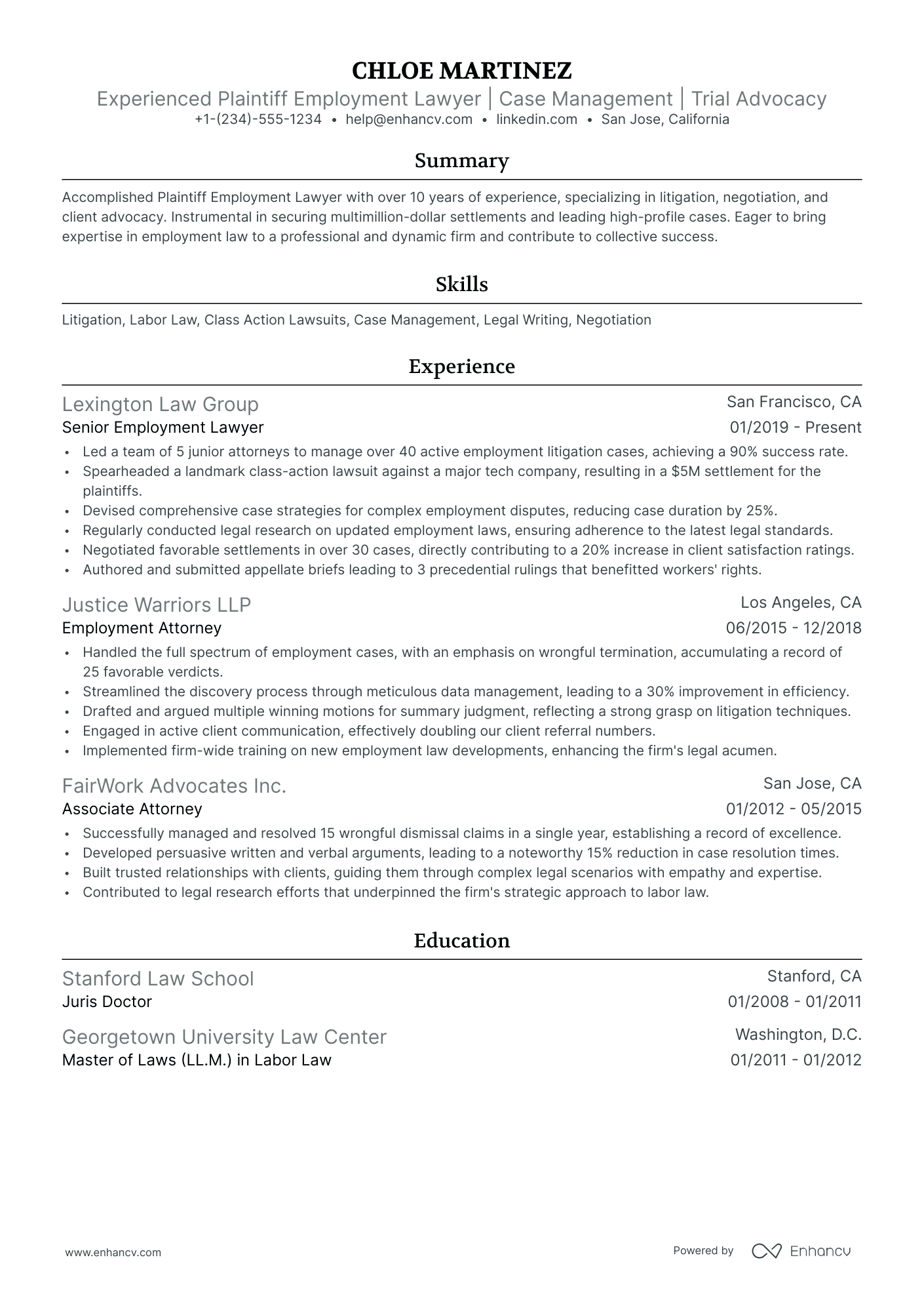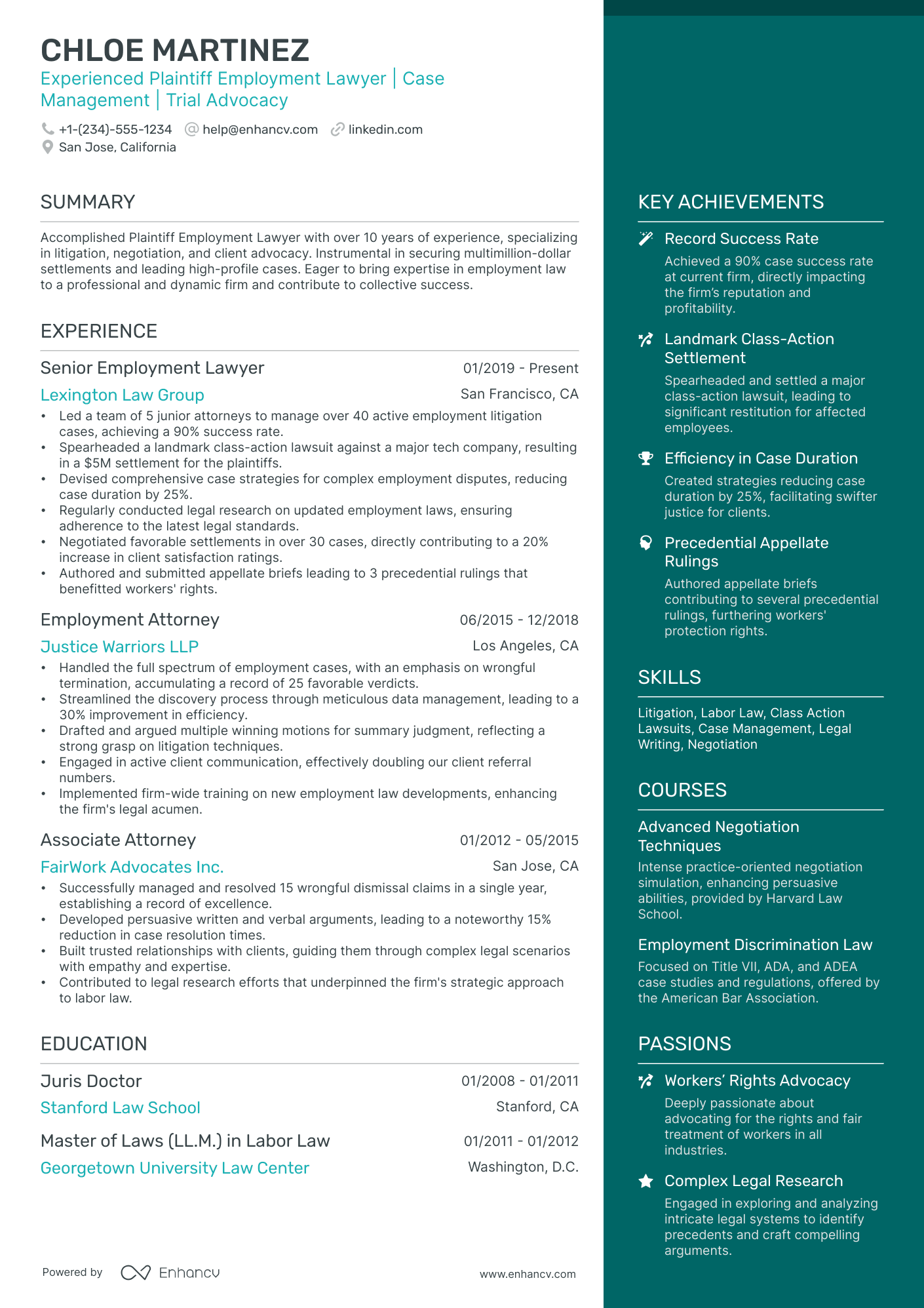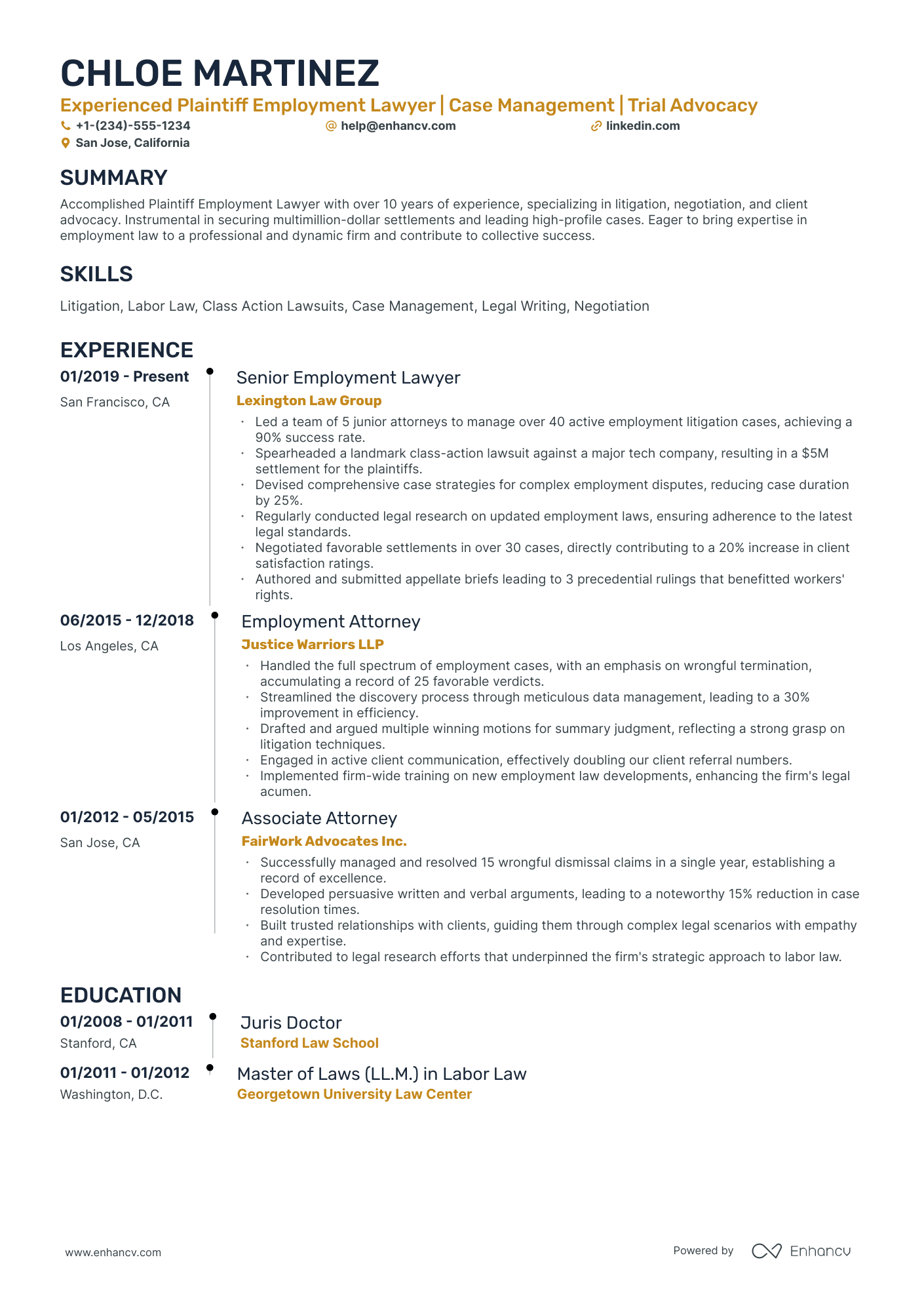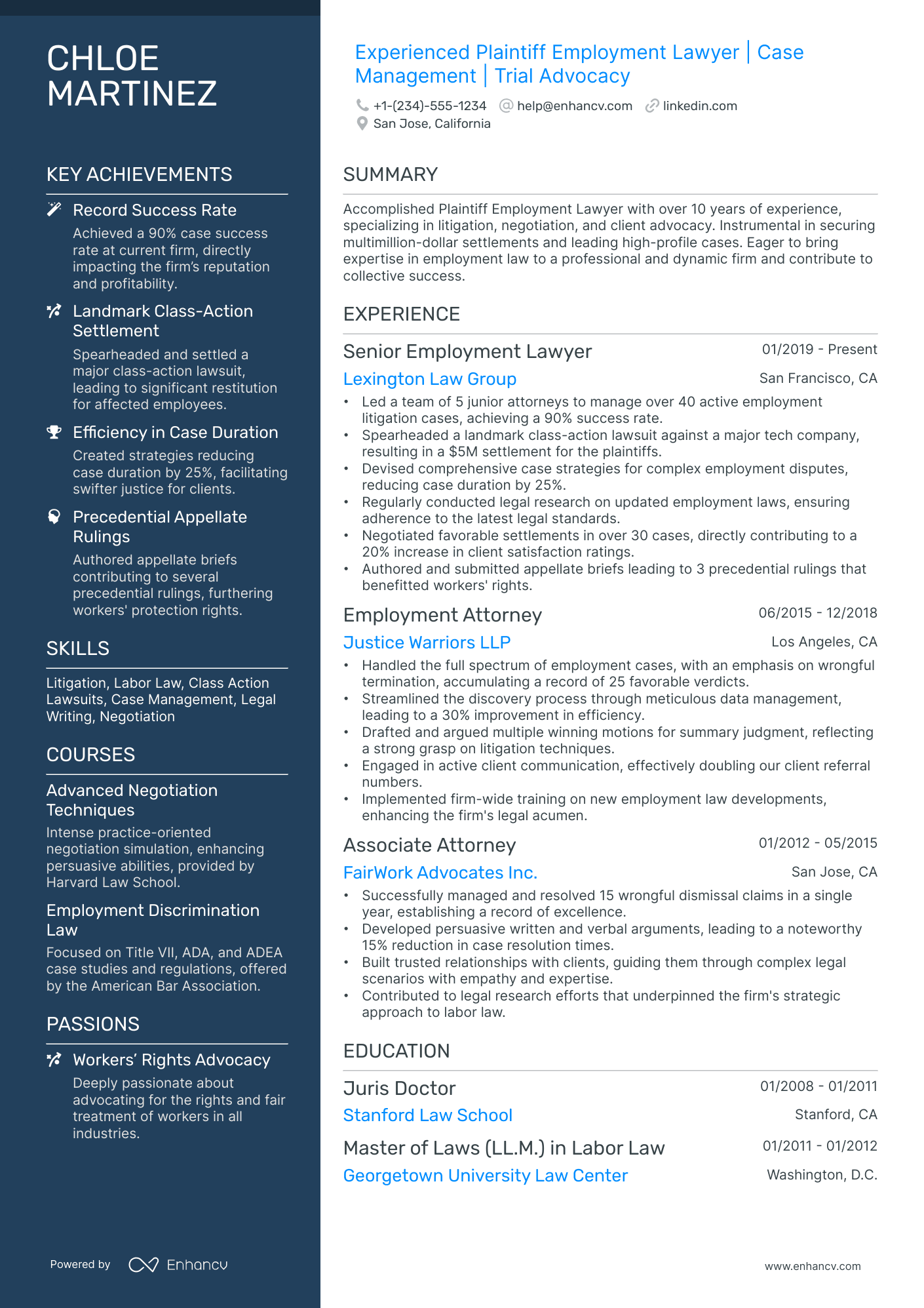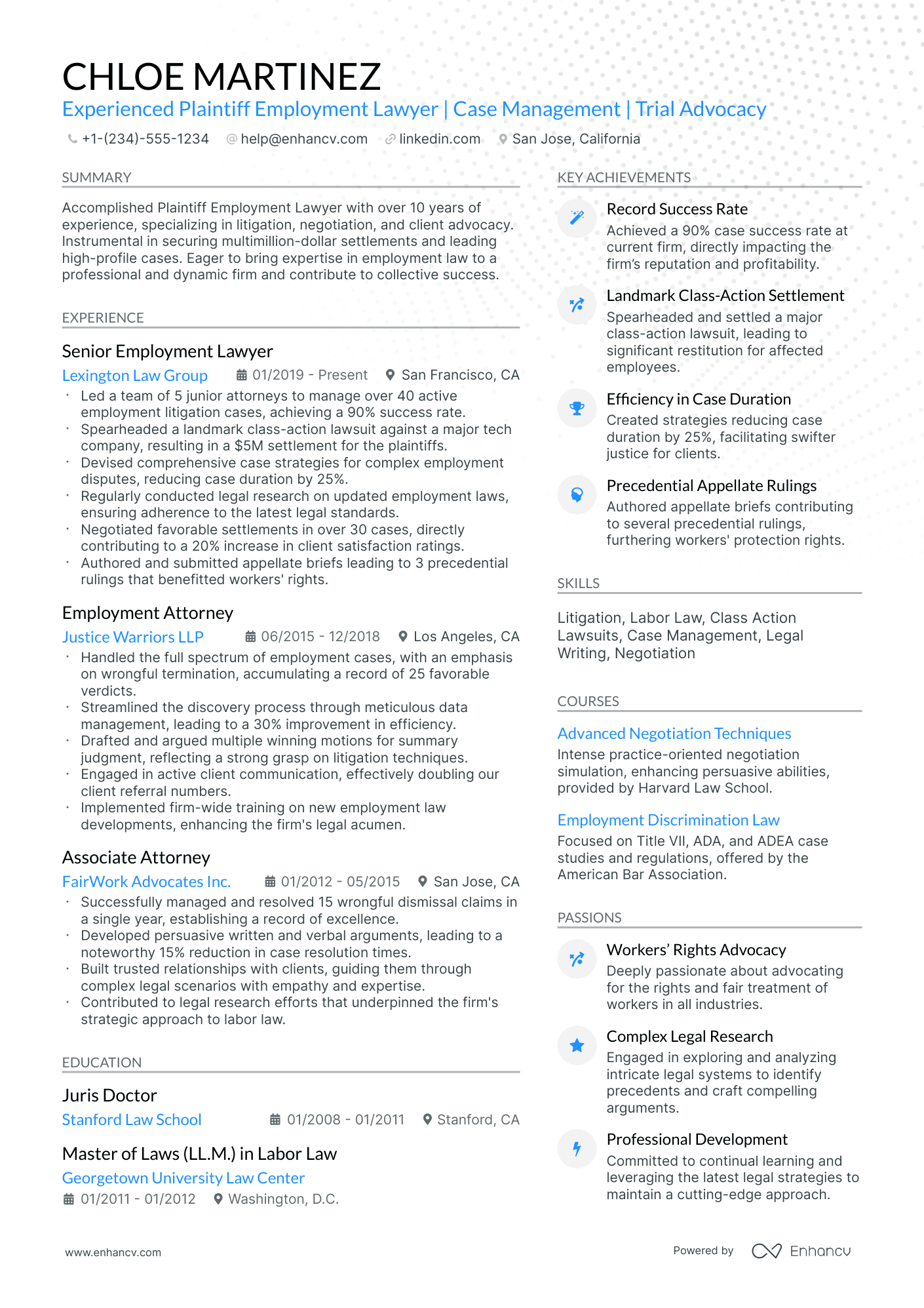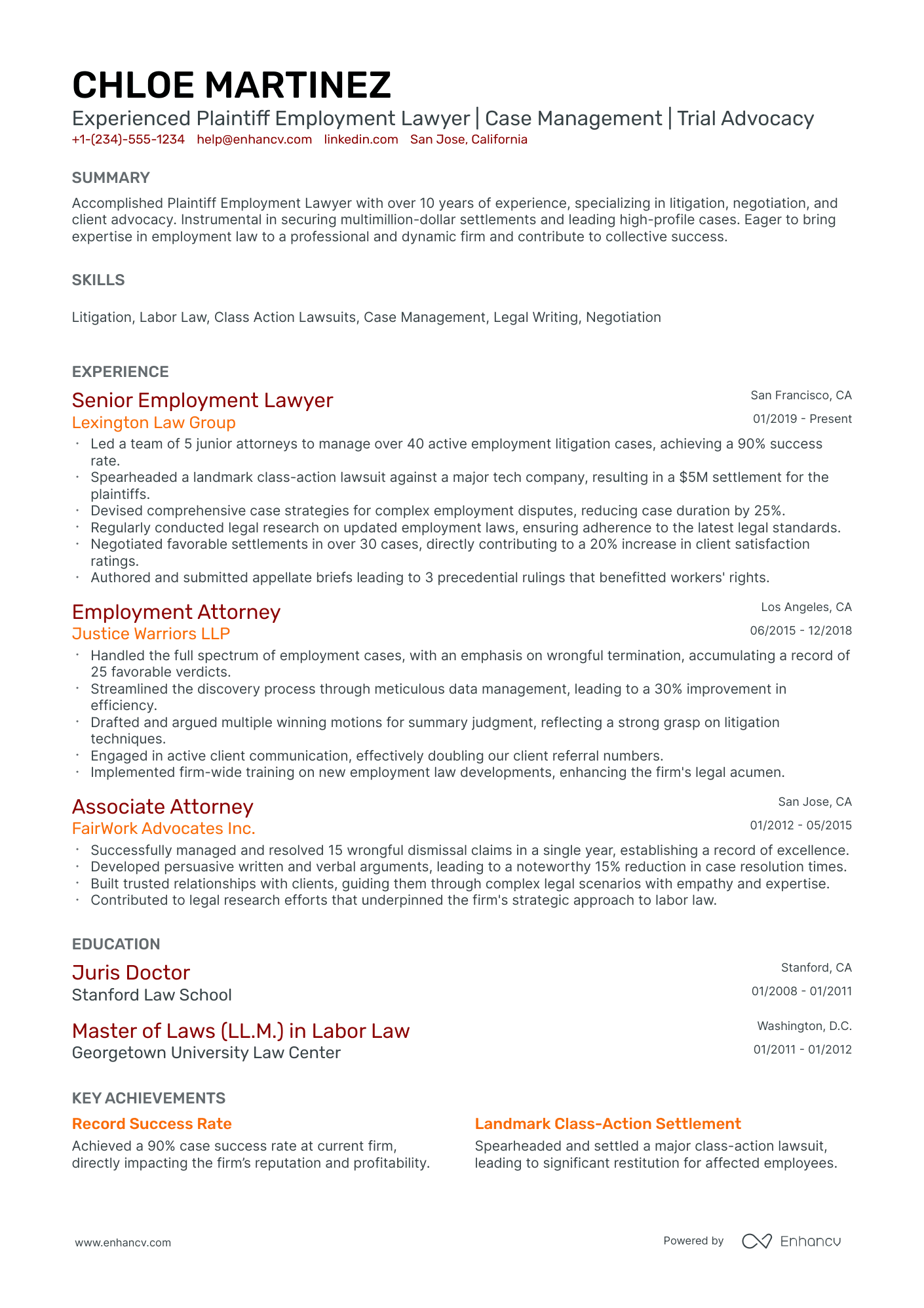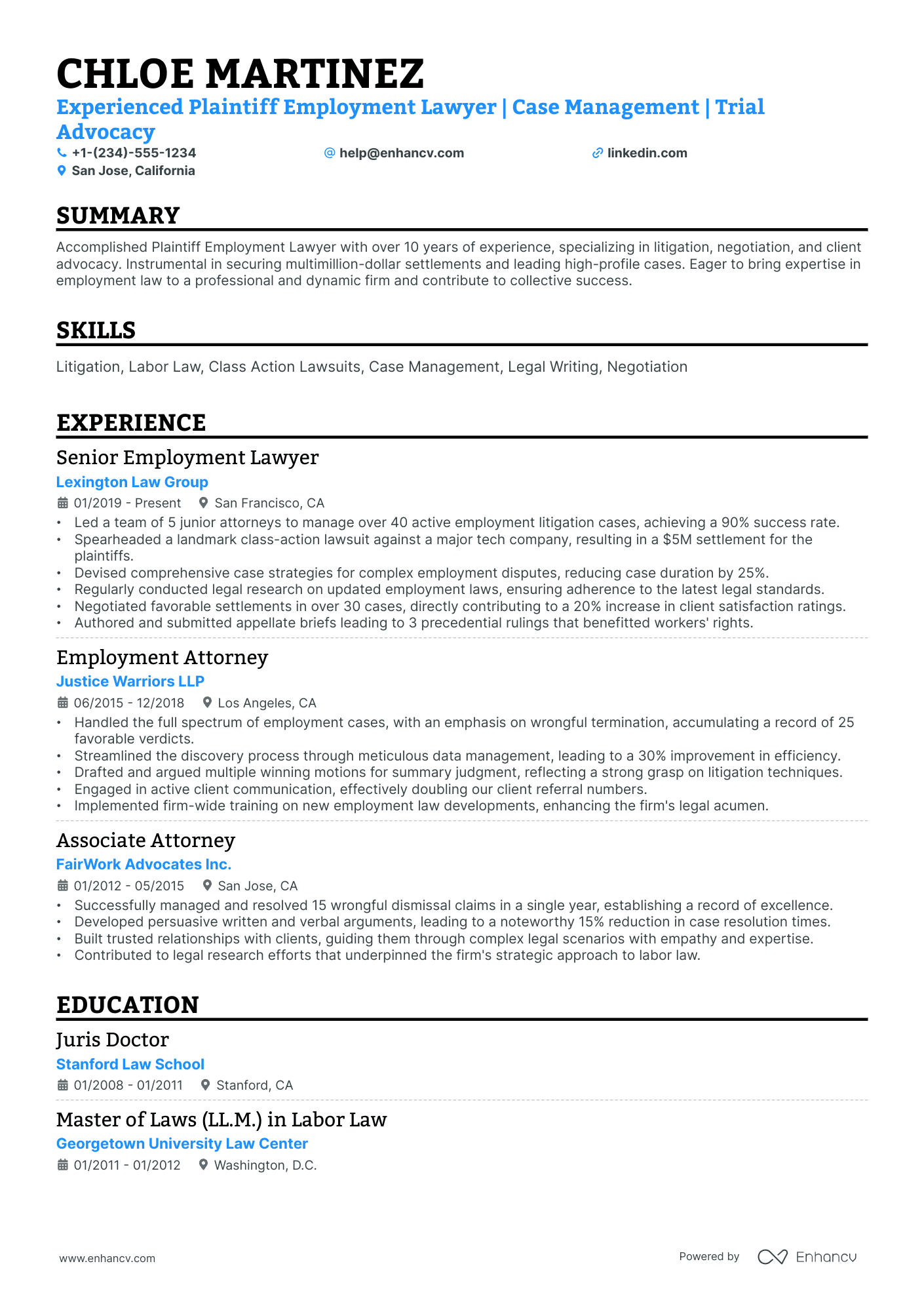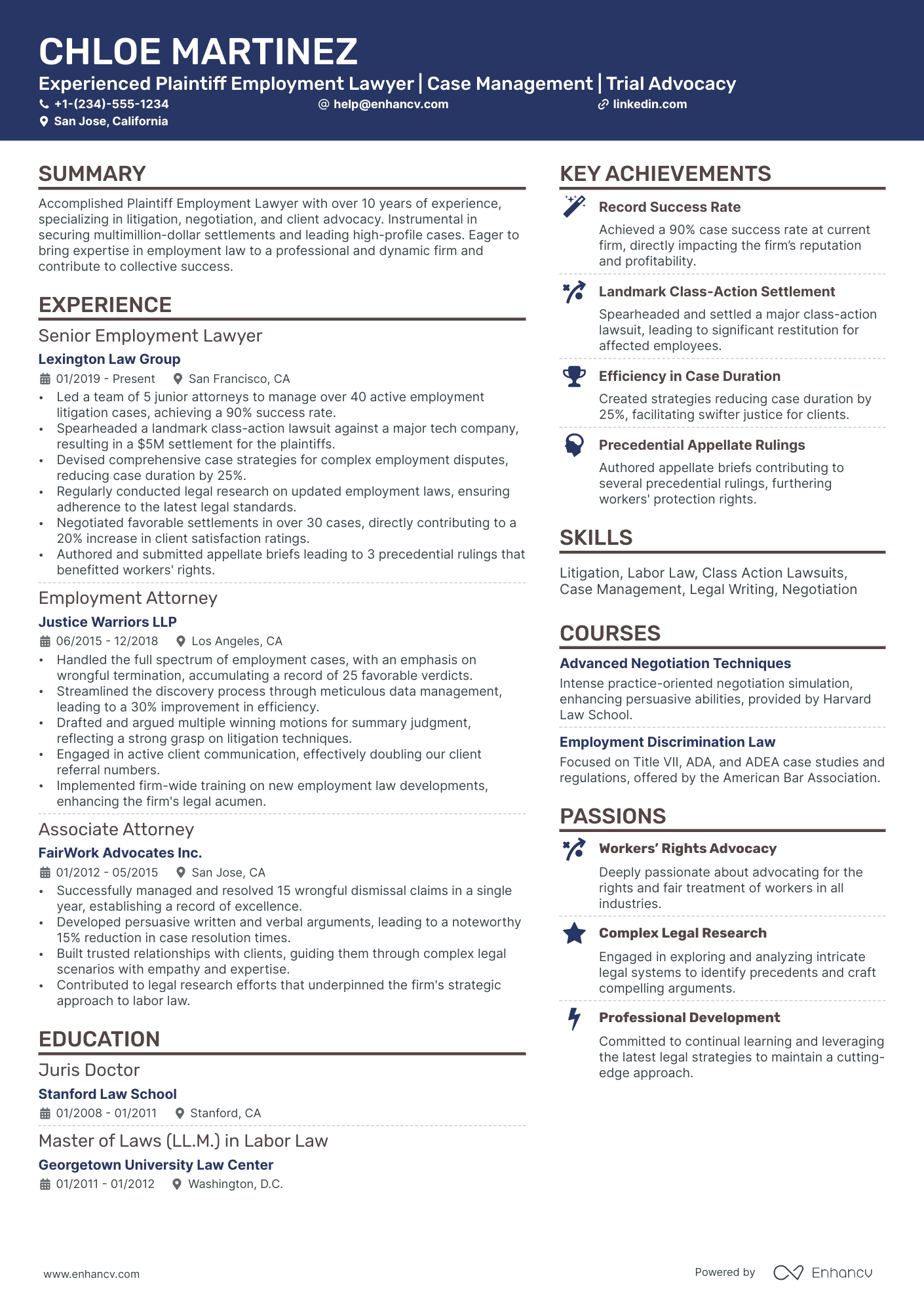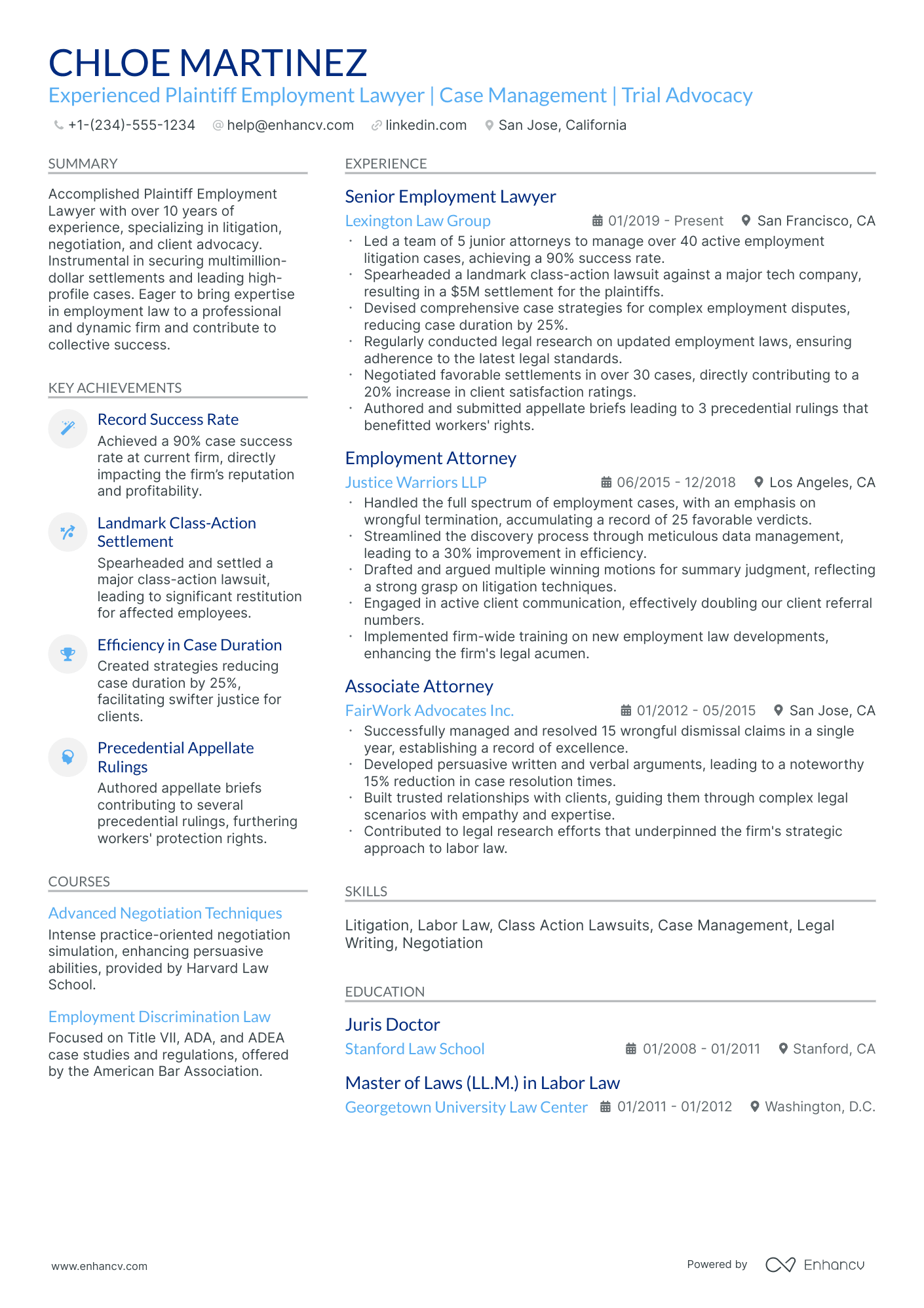As an employment lawyer, articulating your unique legal expertise and case successes on a resume without breaking client confidentiality can be a daunting challenge. Our comprehensive guide provides strategic advice on showcasing your professional accomplishments while ensuring you stay within ethical boundaries.
- Format your employment lawyer resume to ensure that it balances professionalism with creativity, and follows the best practices.
- Match the employment lawyer job requirements by including industry keywords on your resume.
- Use various resume sections to showcase your skills and achievements to answer why you're the best candidate for the employment lawyer role.
Take inspiration from leading employment lawyer resume examples to learn how to tailor your experience.
Is there a correct way to format your employment lawyer resume?
This is a tricky question. While skimming over your resume, recruiters will be looking at your experience and the message your profile conveys. That's why your resume format needs to be clear and concise, serving to supplement and organize your experience. Professional best practices point that the best employment lawyer resumes:
- Follow the reverse chronological order, where the most recent experience items are presented first . This is to keep your expertise succinct and to show recruiters your career growth over the years;
- Have a clearly defined header that includes all relevant contact information and a portfolio or a LinkedIn link. In some countries, it is acceptable to include a professional photo , so that your application is more memorable;
- Feature the most important employment lawyer resume sections towards the top, e.g. summary, skills, and experience. That way, recruiters can immediately find information that is relevant to the role;
- Take up no more than two pages - and two pages are the exception for more experienced professionals. Keep your expertise to the point and use your employment lawyer resume real estate wisely .
- Selecting modern, yet simple fonts, e.g. Rubik, Lato, etc., would help your application stand out;
- Many candidates stick with the tried-and-tested Arial or Times New Roman, but you'd want your employment lawyer resume to be a bit more unique;
- The ATS can read all serif and sans-serif fonts, so you should avoid fancy, formal script (or cursive) fonts.
Consider the local standards – Canadian resumes, for example, may have a different format.
Upload & Check Your Resume
Drop your resume here or choose a file. PDF & DOCX only. Max 2MB file size.
PRO TIP
Showcase any ongoing or recent educational efforts to stay updated in your field.
The five (plus) definite sections your resume for a employment lawyer job should include are:
- Header with your headline, contact details, and/or a preview of your work
- Summary (or objective) to pinpoint how your success aligns with the role
- Experience with bullets of your most relevant achievements in the field
- Skills to integrate vital job requirements (both technical and personal)
- Your further dedication to the field, showcased via relevant higher education and/or certifications
What recruiters want to see on your resume:
- Demonstrated experience in labor law, including specific cases or types of cases handled, such as wrongful termination, discrimination, wage and hour disputes, and union negotiations.
- Expertise in federal, state, and local employment regulations, showing a deep understanding of laws like the Fair Labor Standards Act (FLSA), Americans with Disabilities Act (ADA), and Family and Medical Leave Act (FMLA).
- Success rate in litigation and dispute resolution, indicating experience with trials, arbitrations, mediations, and administrative hearings.
- Ability to advise and train employers on legal compliance and risk management, including drafting employee handbooks, policies, and contracts.
- Membership in professional legal organizations, certifications, or continuing legal education in employment law, highlighting commitment to staying current in the field.
Advice for your employment lawyer resume experience section - setting your application apart from other candidates
Your resume experience section needs to balance your tangible workplace achievements with job requirements.
The easiest way to sustain this balance between meeting candidate expectations, while standing out, is to:
- Select really impressive career highlights to detail under each experience and support those with your skills;
- Assess the job advert to define both the basic requirements (which you could answer with more junior roles) and the more advanced requirements - which could play a more prominent role through your experience section;
- Create a separate experience section, if you decide on listing irrelevant experience items. Always curate those via the people or technical skills you've attained that match the current job you're applying for;
- Don't list experience items from a decade ago - as they may no longer be relevant to the industry. That is, unless you're applying for a more senior role: where experience would go to demonstrate your character and ambitions;
- Define how your role has helped make the team, department, or company better. Support this with your skill set and the initial challenge you were able to solve.
Take a look at how real-life employment lawyer professionals have presented their resume experience section - always aiming to demonstrate their success.
- Advised on and negotiated complex executive employment agreements for C-suite level employees for multinational corporations, increasing client satisfaction by 20%.
- Spearheaded a defense case for a Fortune 500 company facing a class action lawsuit involving 5,000 plaintiffs which was settled favorably, saving the company an estimated $30M.
- Developed and implemented revised compliance training programs regarding workplace discrimination laws across subsidiaries, improving company-wide adherence by 35%.
- Led a team of associates providing legal counsel on employment law matters, including wage claims and wrongful termination cases, reducing client liabilities by 25% annually.
- Managed legal aspects of corporate restructuring, including RIFs, WARN Act compliance, and severance package negotiations, protecting client interests during transition.
- Crafted and reviewed company policies for over 50 corporate clients to ensure regulatory compliance and minimize potential legal exposure.
- Successfully litigated over 100 employment cases pertaining to FLSA, discrimination, and harassment, achieving favorable outcomes in 90% of the cases.
- Advised tech startups on the implementation of compliant remote work policies, effectively navigating the changes brought by emerging telecommuting laws.
- Conducted internal investigations into allegations of workplace misconduct, providing detailed reports and recommendations that significantly reduced risks of escalation to litigation.
- Oversaw employment contract negotiations and dispute resolutions for a diverse range of clients, ensuring fair terms and mitigating future disagreements.
- Collaborated in a cross-functional team to develop AI-based analytics tools for predicting litigation risks, which cut research time by 40% and improved case outcome predictions.
- Provided pro bono legal counsel to non-profit organizations on employee handbooks and policies, which enhanced the organizations' HR practices and reduced legal challenges.
- Conducted extensive due diligence for a $2 billion company merger, identifying and mitigating employment law risks leading to a smooth transition and integration of personnel.
- Played a critical role in advising on the complexities of cross-border employment issues associated with international M&A activities.
- Implemented a series of workforce training modules on EEO laws that were subsequently adopted as part of the mandatory company-wide training program.
- Navigated a broad range of employment-related issues, such as ADA compliance and FMLA claims, for clients in the healthcare sector, reducing litigation risk by 30%.
- Educated corporate clients on the legal implications of social media policies in the workplace, leading to enhanced digital conduct codes and fewer incidents of policy breach.
- Facilitated mediation and arbitration sessions for high-conflict employment disputes, resolving over 80% of cases without the need for costly litigation.
- Orchestrated the defense strategy for numerous wage and hour audits by the Department of Labor, resulting in a substantial decrease in penalties for the client companies.
- Played a key part in the successful navigation of union negotiations for a regional hospital network, ensuring continued operations without workforce interruptions.
- Authored thought leadership articles on emerging employment law issues which positioned the firm as an authoritative voice in employment law community.
- Advised on the formulation of employee benefit programs that conformed to legal standards while meeting strategic business objectives, enhancing employee retention by 15%.
- Collaborated on a large-scale audit of I-9 compliance for multinational corporations, significantly reducing the risk of government fines and sanctions.
- Managed sensitive whistleblower claims ensuring both legal compliance and protection for the claiming employees, resulting in a commendation from the board.
- Spearheaded the development of a cutting-edge digital compliance system that tracked employees' work hours and leave, greatly diminishing wage and hour disputes.
- Guided several startups during rapid growth phases through the creation of scalable employment structures that support sustained expansion and minimized litigation risks.
- Effectively coached C-level executives on negotiation strategies for labor disputes, often resulting in amicable settlements without escalation.
- Provided expert counsel on the implications of the Affordable Care Act for employee benefits, allowing clients to adjust their policies ahead of enforcement deadlines.
- Facilitated the harmonious resolution of high-stakes wrongful dismissal claims for several venture-backed tech firms, averting negative publicity and fostering an environment of trust.
- Designed and enacted preventative litigation strategies for international labor law issues, proactively addressing potential disputes in areas such as expatriate assignments and global workforce management.
Quantifying impact on your resume
- Include the number of successful employment cases you have litigated to showcase your track record of success.
- List the percentage of cases settled favorably out of court to demonstrate negotiation skills and cost-efficiency.
- Specify the total dollar amount of settlements you've secured for clients to highlight financial impact.
- Detail the number of employment law training sessions you've conducted to show expertise and industry recognition.
- Mention the size of the largest client company you've counseled to indicate your ability to handle complex, high-stakes matters.
- Quantify the amount of employment contract reviews completed to underscore meticulousness and experience.
- Include any published articles or papers with their citation counts to exhibit thought leadership and authority in the field.
- Highlight the number of jurisdictions you are licensed to practice in to illustrate your range and versatility.
Action verbs for your employment lawyer resume
What can candidates do about their resume, if they have no experience
Job requirements can sometimes be answered by other elements you could make more prominent in your employment lawyer resume.
Thus, you'd be substituting your lack of experience with your relevant:
- Education with details of skills you've obtained that align with the job
- Internships and short-term jobs that are once more dedicated to putting your expertise in the spotlight
- Skills section answering basic and - potentially - more specific job qualifications
- Strengths or accomplishments to show the unique value you present, even as a candidate with less or no professional experience in the industry.
Recommended reads:
PRO TIP
The more trusted the organization you've attained your certificate (or degree) from, the more credible your skill set would be.
Employment lawyer resume skills: the essential hard skills and soft skills checklist
Ultimately, your employment lawyer resume should hint to recruiters that you possess an array of talents that are indispensable to the role.
For example, listing the technologies and software you're apt at using (or your hard skills) and how you apply them in your day-to-day responsibilities would ensure you meet the technical requirements of the role.
But is this enough to ensure that you make a good impression on recruiters?
Go a step further by detailing the soft skills or personality traits you've attained thanks to your work and life experience.
The best way to balance hard skills and soft skills on your employment lawyer resume is by:
- Highlighting up to three of your most noteworthy career accomplishments in a separate section.
- Listing at least one hard skill and one soft skill you've used to solve a particular challenge or problem.
- Feature niche skills and technologies that would help you stand out amongst candidates.
- Think back on the social impact your efforts have had towards improving the work environment - were you able to always maintain a professional ethic, while enhancing the team culture? Write about your contribution to the role, department, or organization itself as a metric of success.
The skills section of your resume provides you with plenty of opportunities to detail your technical and personal traits.
All you have to do is select the talents that best fit your application and expertise. Make note of some of the most prominent hard and soft skills across the industry from our list:
Top skills for your employment lawyer resume:
Legal Research Tools
Case Management Software
Document Automation Software
E-discovery Tools
Contract Management Systems
Time Tracking Software
Legal Writing Software
Westlaw
LexisNexis
Microsoft Office Suite
Negotiation
Critical Thinking
Communication
Analytical Skills
Attention to Detail
Problem Solving
Interpersonal Skills
Time Management
Empathy
Adaptability
PRO TIP
Always remember that your employment lawyer certifications can be quantified across different resume sections, like your experience, summary, or objective. For example, you could include concise details within the expertise bullets of how the specific certificate has improved your on-the-job performance.
The basics of your employment lawyer resume certifications and education sections
Improve the education and certification sections of your employment lawyer resume by:
- Dedicating more prominent space to certificates that are more recent and have helped you update your skill set
- Keeping all the information you list to the basics: certificate/degree name, institution, and graduation dates
- Writing supplementary information in the details of your certification or education section, only if you lack experience or want to show further skill alignment
- Including your credential or license number, only if the information is valid to your application or certification
Within employment lawyer job adverts, relevant education, and certification are always listed within the key prerequisite for the role.
Ensure you meet all job requirements with some of the leading certificates in the industry:
The top 5 certifications for your employment lawyer resume:
- Senior Professional in Human Resources (SPHR) - Human Resource Certification Institute (HRCI)
- Society for Human Resource Management Senior Certified Professional (SHRM-SCP) - Society for Human Resource Management (SHRM)
- Certified Labor Relations Professional (CLRP) - Labor Relations Institute
- Professional in Human Resources (PHR) - Human Resource Certification Institute (HRCI)
- Master of Laws (LL.M.) in Employment Law - Various accredited law schools
PRO TIP
Mention specific courses or projects that are pertinent to the job you're applying for.
Recommended reads:
Choosing between a employment lawyer resume summary or objective
Many may argue that, in recent times, the employment lawyer resume summary or objective has become completely obsolete.
But the reality is different as both of these resume sections provide you with an opportunity to :
- integrate employment lawyer-vital keywords
- showcase your accomplishments
- answer why you're applying for this particular role.
The difference (between the summary and the objective) is that the:
- Resume objective puts your career goals in a more prominent position.
- Resume summary focuses more on career milestones.
We recommend you select the summary if you happen to have plenty of experience you'd like to spotlight from the very start of your employment lawyer resume.
Meanwhile, the objective is ideal for those candidates who'd like to further prove their suitability for the role with their goals and soft skills.
We've featured some industry professional employment lawyer resume samples to the best resume summary and objective structures:
Resume summaries for a employment lawyer job
- With over 8 years of dedicated experience in employment law, I have honed my skills in workplace disputes, labor relations, and anti-discrimination laws at a renowned New York legal firm. My advocacy has led to precedent-setting victories in wrongful termination cases, bolstering my reputation as a pivotal player in employment litigation.
- As a seasoned HR professional transitioning into employment law, my 12-year expertise in employee relations and compliance equips me with a unique perspective. My strategic oversight in developing HR policies aligns seamlessly with legal principles, having successfully navigated complex workforce issues for a multinational corporation.
- A former business executive with a 10-year track record, I am pivoting to employment law armed with an in-depth understanding of corporate operations and employee management. My successful negotiation of multimillion-dollar contracts provides a foundation for resolving high-stakes employment disputes with a commercial sensibility.
- Eager to contribute my robust analytical and litigation skills as a freshly credentialed JD graduate, I am deeply committed to advocating for workers' rights and ethical employment practices. My academic excellence, coupled with internships at top labor law firms, prepped me to make meaningful impacts in employee justice.
- Seeking to apply my exceptional research abilities and passion for labor laws, I aim to advance in the dynamic field of employment law. My recent law degree, bolstered by academic accolades and a meticulous internship, has prepared me to tackle complex legal challenges and uphold the rights of the workforce.
Optimize your resume summary and objective for ATS
Drop your resume here or choose a file.
PDF & DOCX only. Max 2MB file size.
Showcasing your personality with these four employment lawyer resume sections
Enhance your employment lawyer expertise with additional resume sections that spotlight both your professional skills and personal traits. Choose options that not only present you in a professional light but also reveal why colleagues enjoy working with you:
- My time - a pie chart infographic detailing your daily personal and professional priorities, showcasing a blend of hard and soft skills;
- Hobbies and interests - share your engagement in sports, fandoms, or other interests, whether in your local community or during personal time;
- Quotes - what motivates and inspires you as a professional;
- Books - indicating your reading and comprehension skills, a definite plus for employers, particularly when your reading interests align with your professional field.
Key takeaways
- All aspects of your resume should be selected to support your bid for being the perfect candidate for the role;
- Be intentional about listing your skill set to be balanced with both technical and people capabilities, while aligning with the job;
- Include any experience items that are relevant to the role and ensure you feature the outcomes of your responsibilities;
- Use the summary or objective as a screenshot of your best experience highlights;
- Curate various resume sections to showcase personal, transferable skills.
